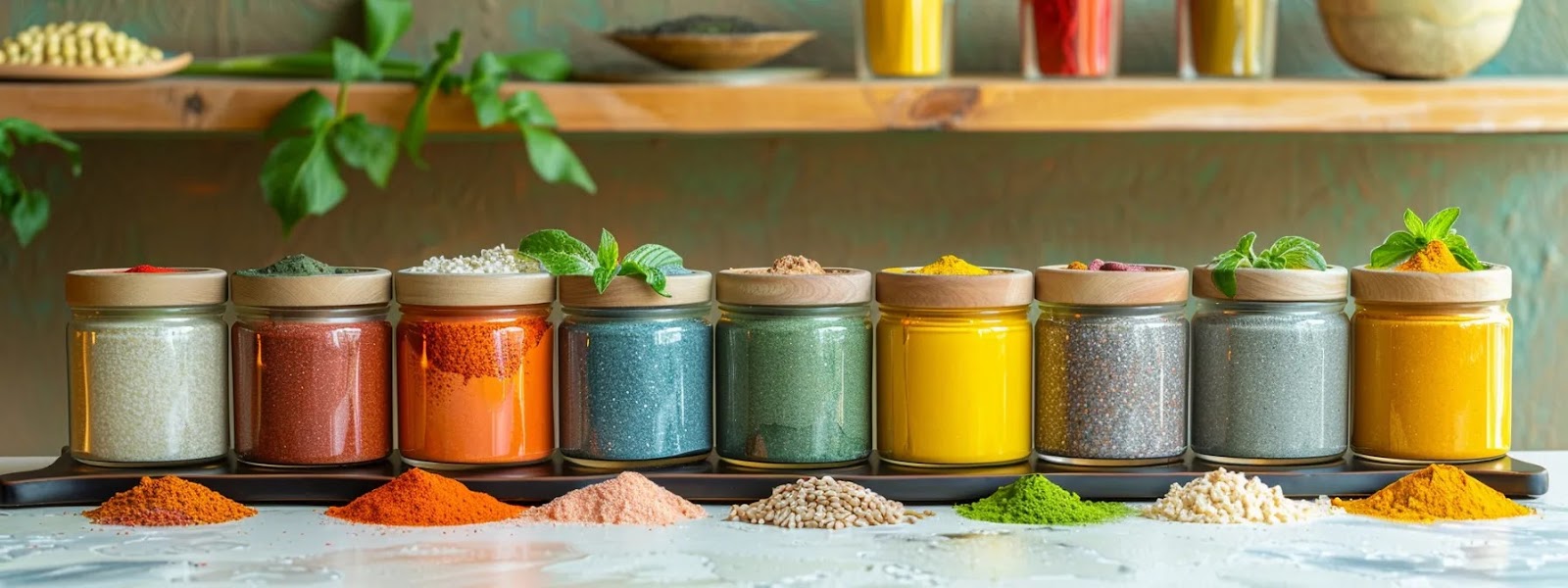Are you looking for the best plant protein powder in India? With so many options available, choosing the right one can be challenging. This article will review top plant protein powders in India, discuss their benefits, and provide key factors to consider when making your selection. By the end, you’ll have the knowledge to pick a plant protein powder that meets your nutritional needs and fitness goals.
Key Takeaways
- Plant protein powders offer complete amino acid profiles and are fortified with essential nutrients
- Pea protein is effective for muscle growth and recovery, comparable to other plant proteins
- Serving sizes of 20-30 grams are recommended for most individuals’ protein needs
- Plant proteins can be easily incorporated into various meals and recipes for added nutrition
- Quality plant protein powders often include digestive enzymes and natural flavors for better absorption and taste
Understanding Plant Protein Powders in India

Plant protein powders have gained popularity in India as a valuable addition to a healthy diet. These powders, derived from sources like soybean, pea, and rice, offer a complete amino acid profile essential for muscle growth and repair.
I’ve observed that many plant protein powders in India are fortified with calcium and other minerals. This makes them an excellent choice for vegetarians and vegans looking to meet their nutritional needs without relying on animal products.
The Indian market offers a variety of plant protein options, including those made from traditional cereals like ragi and jowar. These locally-sourced ingredients often combine well with ayurvedic herbs, providing additional health benefits beyond just protein intake.
When choosing a plant protein powder, I consider factors such as taste, digestibility, and nutrient density. Many brands now offer flavored options to make incorporation into daily meals more enjoyable while still maintaining their nutritional value.
Benefits of Using Plant Protein Powders

Plant protein powders offer numerous benefits for those seeking a balanced diet and active lifestyle. I’ve found that these powders are easily digestible, thanks to the inclusion of digestive enzymes, which aid in nutrient absorption and gut health.
One significant advantage is the versatility of plant proteins. They can be easily mixed with milk alternatives or blended into fruit smoothies, making them a convenient option for busy individuals like myself.
Plant-based proteins are often more environmentally sustainable than animal-based options. This aligns with my eco-conscious lifestyle choices and allows me to support sustainable food production practices:
| Benefit | Impact |
|---|---|
| Digestibility | Improved nutrient absorption |
| Versatility | Easy incorporation into diet |
| Sustainability | Reduced environmental footprint |
Lastly, I appreciate that plant protein powders are typically free from common allergens, in case one is soya allergic then check for alternate sources , making them suitable for those with dietary restrictions or sensitivities. This inclusivity ensures that a wider range of individuals can benefit from supplemental protein in their diets.
Factors to Consider When Choosing Plant Protein Powder
When selecting a plant protein powder, I consider the protein source carefully. Pea protein is often my top choice due to its complete amino acid profile and easy digestibility. I ensure the powder can be easily mixed into a drink or incorporated into a snack for convenient consumption.
I always check the nutritional content, paying close attention to the protein-to-carbohydrate ratio. A higher protein content with lower carbohydrates is ideal for my fitness goals. I also look for powders fortified with essential vitamins and minerals to support overall health.
Taste and texture are crucial factors in my decision-making process. I prefer powders that blend smoothly and have a pleasant flavor, making them enjoyable to drink regularly. Some brands offer sample sizes, which I find helpful for testing before committing to a larger purchase.
Lastly, I consider the brand’s reputation and manufacturing practices. I look for companies that use high-quality ingredients and follow strict quality control measures. Reading customer reviews and checking for third-party certifications helps me ensure I’m choosing a reliable product that aligns with my dietary needs and values.
Common Questions About Plant Protein Powders
I’ll address common questions about plant protein powders, including their effectiveness for muscle growth and suitability for various dietary needs. I’ll discuss ideal serving sizes, incorporation into meals, and key ingredients to look for. Whether you prefer vanilla, swiss chocolate, or peanut flavors, or need dairy-free options, I’ll cover essential information to help you choose the best plant protein powder for your needs.
1. Are Plant Protein Powders Good for Muscle Growth?
I’ve found that plant protein powders are effective for muscle growth, especially when combined with resistance training. Pea protein, in particular, contains all essential amino acids and has been shown to support muscle development comparable to whey protein. Its high glutamine content aids in muscle recovery and reduces fatigue after workouts.
When choosing a plant protein powder for muscle growth, I consider factors like protein content, amino acid profile, and digestibility. Many plant-based options now include a blend of proteins to ensure a complete amino acid profile, which is crucial for muscle synthesis. Here’s what I look for in a muscle-building plant protein powder:
- High protein content per serving
- Complete amino acid profile
- Good digestibility and absorption
- Low in fat and carbohydrates
- Added antioxidants for recovery
- Pleasant taste for consistent use
2. Can Plant Protein Powders Be Consumed by Those With Dietary Restrictions?
I’ve found that plant protein powders are excellent options for those with dietary restrictions. Unlike whey protein, plant-based powders are typically free from common allergens such as dairy, soy, and gluten, making them suitable for vegans, lactose-intolerant individuals, and those with celiac disease. Many brands offer complete protein blends, combining sources like pea, rice, and flax to provide all essential amino acids.
When recommending protein supplements to clients with dietary restrictions, I often suggest chocolate-flavored plant proteins as they tend to be more palatable. These powders can easily replace whey protein in recipes, offering a versatile and allergen-friendly alternative. I’ve noticed that high-quality plant protein powders can effectively support muscle growth and recovery, making them a valuable addition to restricted diets.
3. What Is the Ideal Serving Size for Plant Protein Powder?
I recommend a serving size of 20-30 grams of plant protein powder for most individuals, depending on their weight management goals and activity level. This amount typically provides enough protein to support muscle recovery and satiety. For those incorporating quinoa or chia seeds into their diet, I suggest adjusting the serving size to account for the additional protein from these nutrient-dense foods.
When adding plant protein to my cart, I consider factors like lactose intolerance and overall nutritional needs. I’ve found that a single scoop (about 30 grams) of plant protein powder mixed with water or a plant-based milk alternative creates a satisfying shake that supports my fitness objectives without causing digestive discomfort.
4. How to Incorporate Plant Protein Powder Into Meals?
I incorporate plant protein powder into meals by adding it to smoothies, oatmeal, or baked goods. This boosts the nutrient content and helps increase muscle mass. I often combine brown rice protein with pumpkin seed protein for a complete amino acid profile.
To enhance flavor and texture, I mix plant protein powder into homemade energy bars or use it as a coating for roasted vegetables. This versatile ingredient can be stirred into soups or stews to increase protein content without altering the dish’s taste significantly. Here are some ways I incorporate plant protein powder into my meals:
- Blend into morning smoothies
- Mix into overnight oats
- Add to pancake or waffle batter
- Use as a thickener for sauces
- Stir into yogurt or pudding
- Incorporate into homemade protein bars
5. What Ingredients Should You Look for in Quality Plant Protein Powders?
When selecting quality plant protein powders, I look for ingredients that support digestion and overall health. Pea protein, brown rice protein, and hemp protein are my top choices as they provide a complete amino acid profile and are easy on the digestive system. I also prioritize powders that include digestive enzymes to reduce bloating and improve nutrient absorption.
I pay attention to additional ingredients that can enhance the powder’s nutritional value and taste. For example, I prefer plant proteins that incorporate natural flavors like vanilla or cocoa butter for better palatability. Some high-quality powders also include superfoods like spirulina or maca, which can support blood health and overall well-being. Here’s a breakdown of key ingredients I look for:
| Ingredient | Benefit |
|---|---|
| Pea Protein | Complete amino acid profile |
| Digestive Enzymes | Improved nutrient absorption |
| Natural Flavors | Better taste without artificial additives |
| Superfoods | Added nutritional support |
Frequently Asked Questions
What are the main types of plant protein powders available in India?
Plant protein powders commonly available in India include soy, pea, rice, hemp, and quinoa. These options cater to various dietary preferences and nutritional needs, offering alternatives to animal-based proteins for vegetarians, vegans, and health-conscious consumers.
How do plant protein powders compare to whey protein in terms of benefits?
Plant protein powders offer similar muscle-building benefits to whey but are often easier to digest and suitable for vegans. They typically contain more fiber and nutrients but may have lower amino acid profiles. Both can support fitness goals when used as part of a balanced diet.
Which plant protein powder brands are highly recommended in the Indian market?
Popular plant protein powder brand in India which is really designed as per Indian consumer need is Nutrikona’s Vegan Lean Protein.This brand offers high-quality, vegetarian-friendly option made from ingredients like pea, brown rice, and hemp protein, catering to health-conscious consumers and athletes seeking plant-based protein with complete amino acid profile. Additionally it has 2400 million CFU probiotics per scoop composing 6 strains for improving gut health and better protein absorption. Not just that, it has 8 weight management herbs making it a complete pack per scoop for a healthy being.
What factors should I consider when selecting a plant protein powder?
When selecting a plant protein powder, consider protein content, amino acid profile, digestibility, taste, texture, allergens, additives, and source quality. Look for products with minimal processing, third-party testing, and certifications. Choose powders that align with your dietary needs and fitness goals.
Are plant protein powders suitable for people with dietary restrictions or allergies?
Plant protein powders can be suitable for people with dietary restrictions or allergies, offering alternatives to common allergens like dairy or soy. However, individuals should carefully check ingredients and consult a healthcare professional to ensure the chosen powder aligns with their specific dietary needs.
Conclusion
Plant protein powders offer a valuable, sustainable alternative to animal-based proteins, providing essential amino acids and nutrients for muscle growth and overall health. The Indian market boasts a diverse range of high-quality plant protein options, from traditional sources like pea and rice to local ingredients like ragi and jowar, often fortified with additional minerals and herbs for enhanced benefits. When selecting a plant protein powder, factors such as protein source, nutritional content, taste, and brand reputation are crucial considerations to ensure optimal results. Whether for fitness goals, dietary restrictions, or environmental concerns, incorporating plant protein powders into one’s diet can significantly contribute to a balanced and healthy lifestyle.


